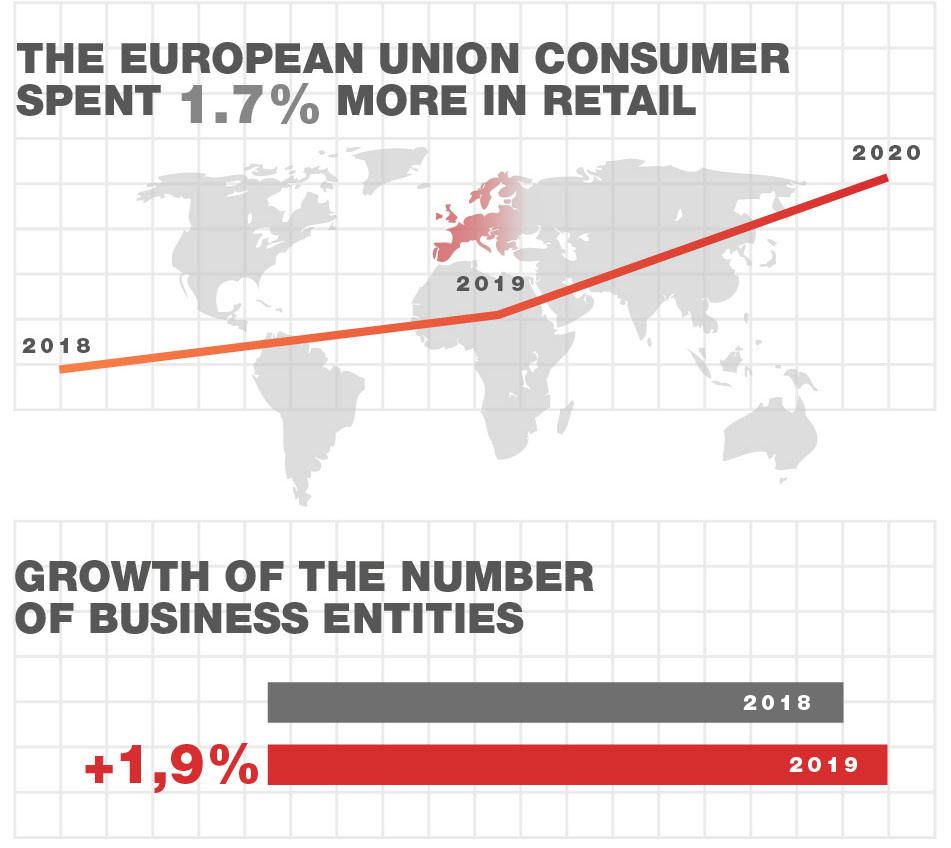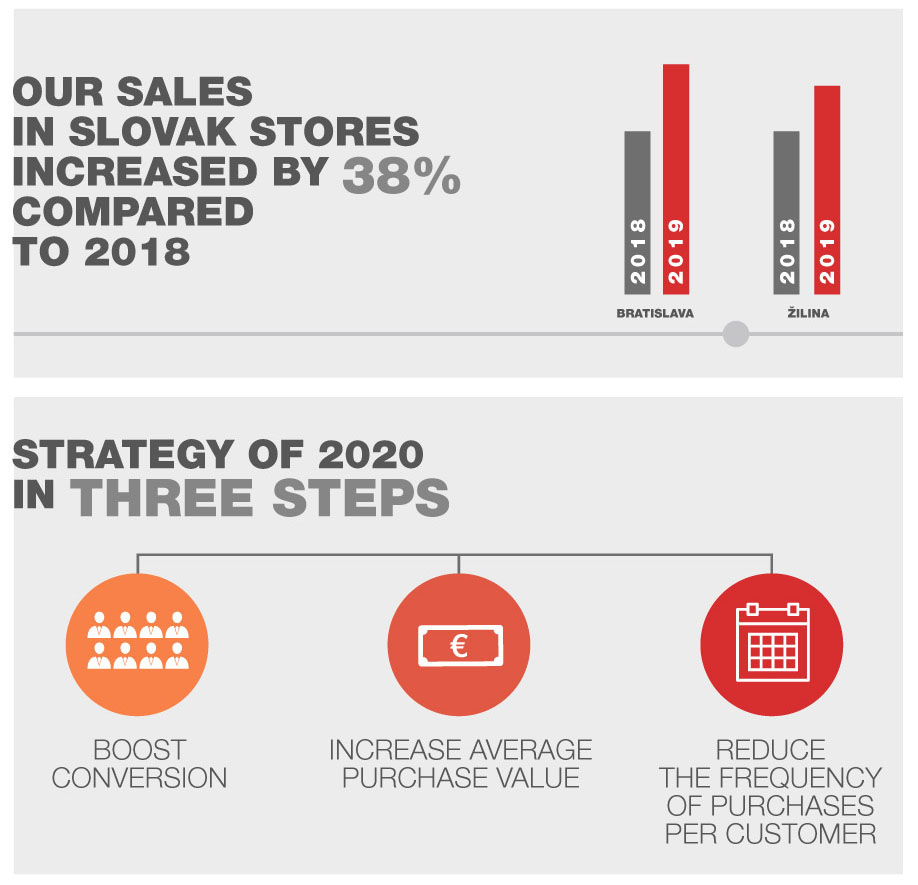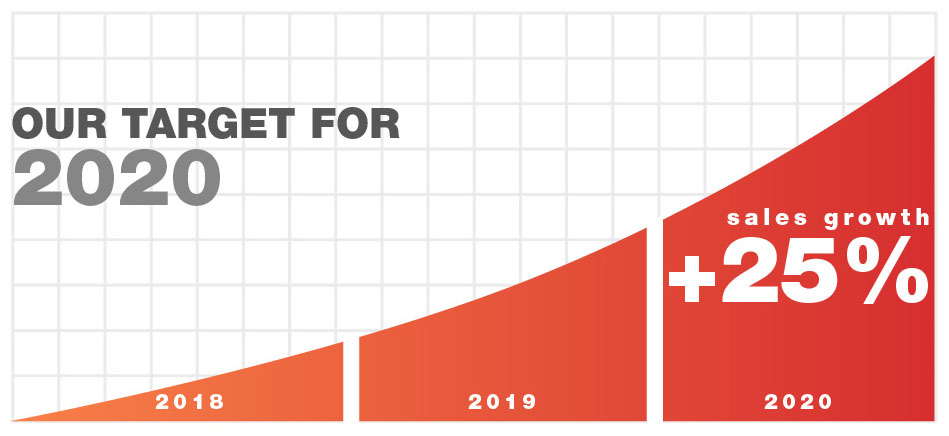Most businessmen expect an easy growth this year. That’s probably because there is an optimist in each of us. Sometimes exaggerated, but which pessimist would get into business today? But is there a reason to think that our sales will continue to grow? Let’s look at it through numbers and statistics.
Year-on-year comparisons of 2018 and 2019 show that the European Union (EU) consumer spent 1.7% more in retail in 2019 than in the previous year. With this figure in mind, we could expect sales to grow by 1.7%, although the figure alone does not tell in which particular segment the mentioned increase occurred.
The second figure that blurs our optimistic hopes is the year-on-year growth of the number of business entities. These increased by 1.9% year-on-year across the EU. Paradoxically, there were more companies with more than 10 employees. The mathematical relationship between these two figures shows that the overall sales were 0.2% lower. The analytical outlook for this year counts with consumer growth of only around 1%. If the amount of new business remains as last year, it would mean lower sales by approximately 1%. It is not a bad number, and many will say that 1% of the decline in sales can easily be made up by a larger margin. True. But I haven’t mentioned that forecasts say it is the big players and big networks that will grow. So, the more growth for companies like Intersport, Decathlon, or Hervis, the worse for a smaller “solo” business. And I’m not talking about the big online players who, thanks to an aggressive pricing policy and almost inexhaustible finances in the form of funds and investors in the background, suck up sales of almost everyone around.

What does it mean for us optimists? If we do everything the way we did in 2019, we will be worse off!
We will not have more customers and our “fight” on social networks will not help either. Why? Most of us are not new to Facebook or Instagram. If we haven’t done anything breakthrough yet, it won’t come. The performance of social networks is behind its peak, which unfortunately has not yet been understood by most companies that continue to push big money to Facebook or Instagram and thus worsening the already declining performance. Even a marketing agency will tell you that you need to develop a strategy on social networks, rushing after the larger group of fans. But unless you give them content that is attractive that also doesn’t force customers into buying your product or service, it’s useless. Social networks still make sense for branding and relationship building, but not sales. If I sound too negative, please, forgive me; I am just trying to realistically point out the direction to be taken.
So, what is the direction? Let’s focus more on what we already have. Our customers!
Our company has several brick and mortar retail stores, from which we receive fast and unbiased information on model responses, learn about customer needs, and constantly explore how to offer our products. To us, our stores are a kind of NEBBIA academy. We pass on the acquired knowledge to our franchise stores and to many B2B partners. Today we want to share this knowledge with you as we want to support you and we want you to sell more of our clothes, too J
Our advantage is the perspective that we can have thanks to the financial assistance of the parent company. As a result, we do not need to generate profits in stores, although it is nice to have it, of course. We can afford to experiment and learn. We thus work with monitored statistics which we evaluate. What did we do in 2019 and what did we find out?
First the numbers. Our sales in Zilina and Bratislava stores, where our experimenting takes place, increased by 38% compared to 2018. This was not due to the extension of the product range or the change of location; it didn’t even happen because we had more customers. And most importantly, it didn’t happen because of discounts or sales. We are not fans of markdowns! Not that we are stingy, but we know that discounts will not bring anything in the long run. Most of our sales growth was due to working with customers. So, where’s the magic? First, it is the low financial demand. In principle, it cost us no additional money, just labor costs. And even better, we still have room for improvement!
But let’s be systematic here. What did we do first?
We began tracking the average purchase value, purchase conversion, and sales per shop assistant. After obtaining enough data, we began to compare individual stores identifying the visible differences in retail staff skill sets. Based on this, we designed the strategy and divided it into the following three steps:
- Get more buyers with the unchanged number of customers, i.e. boost conversion
- Increase average purchase value which had long remained at the €58/purchase level. Within the last year, we managed to raise it to €78/purchase,
- Reduce the frequency of purchases per customer – our biggest challenge.
The third task is still ahead of us this year and we need tools other than just Excel and our hard work to accomplish it. But in simple mathematics: if a customer buys with you every five months and you shorten that time by a month, your sales increased by 20%.

In the end, I will offer a summary so that you are aware of what “treasure” you have at your disposal at home.
If your average purchase value is €58 and you increase it to €78, your revenue will increase by 34%. If you sell to three out of ten customers today and you successfully increase it to four, your sales hike is not 10% but 33%. And finally, if you reduce your repeat purchase by one month, your revenue will increase by additional 20%. Simply summed up. The total increase after successful implementation of the above-mentioned strategy will bring you an additional 87%! Well, that’s worth the effort, what do you say?
In the follow-up newsletters, I want to share with you what we have done and what we’ are planning this year to maintain sales growth. Our target for 2020 is to achieve an increase of 25%; everything above that will be a bonus.







































